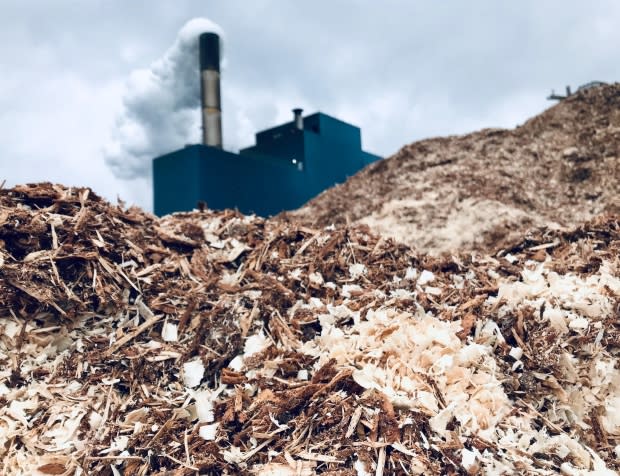Corner Brook mill gets cash influx to go green
The mill in Corner Brook is set to receive almost $14 million in upgrades, with the aim to become more energy efficient and environmentally-friendly, and cut the facility's carbon footprint by 50 per cent.
Before a room crowded with a mix of mill workers and local politicians, Long Range Mountains MP Gudie Hutchings announced the cash, a joint contribution from the federal government and the mill's parent company, Kruger.
"This is great news, and a huge project," said a beaming Darren Pelley, the vice-president and general manager of Corner Brook Pulp and Paper.
The project, split into three parts, focuses mainly on biomass: a mix of bark, wood chips, and other by-products of the forestry process. Biomass is currently used at the mill, where it's burned as fuel, but there's a problem with the current product.
"The biomass right now, a great proportion of it is quite high moisture, pretty wet," said Pelley.
"So what will happen is, this project includes a bark dryer. So it will actually use bark to dry bark, and that will allow us to reduce the [overall] oil consumption."

Pelley estimated the bark dryer will reduce the amount of fossil fuels the mill burns through in the course of a year by nine million litres, and also increase the overall amount of biomass the mill uses, instead of having to dump wet biomass in the landfill.
The money — $4.9 million ponied up by Kruger, with the rest coming from the federal government — will also involve water efficiencies and upgrade the system for receiving biomass off of contractor's trucks.
'This is a big deal'
The owner of the province's largest sawmill said he sends four biomass-filled trucks to the mill each day, on average, and Thursday's announcement brings with it the promise to increase his fleet.
"That's great for us, because we've been stockpiling. We've got tens of thousands of tonnes stockpiled that they've not been able to handle," said Kevin Sexton, the owner of Sexton Lumber, who made the almost five-hour drive from his sawmill in Bloomfield to Corner Brook for the announcement.
"This is a big deal. For not only Sexton Lumber, but the industry as a whole."

Once its new equipment is up and running in about 12 months' time, Pelley said Corner Brook Pulp and Paper will be looking to buy more biomass off the other players in the province's forestry industry.
"Right now, as we're configured, our system is at a bottleneck to additional sawmill growth, and also in the ability to receive more biomass, more bark. This project will allow us to receive additional bark and chips, which allows sawmills to expand," he said.
Future diversification?
The optimism and energy, not to mention the amount of cash, at Thursday's announcement is a marked reversal in fortunes for the mill from just over a year ago.
In March of 2018, the American government announced a steep tariff on Canadian newsprint that would have cost the mill $30-million extra a year. Those tariffs were overturned in August, and Pelley said throughout the battle and afterward, Kruger has been reinvesting in its Corner Brook operations.
The biomass project, said Pelley, "is the first pillar, to allow us to move towards a diversification strategy," although he declined to elaborate on what specific products that diversification away from newsprint might entail.

Along with the Corner Brook investment, Kruger also announced Thursday it would be spending almost $23-million at its plant in Brompton, Que., to produce a biodegradable food wrapper made entirely from recycled paper.
"This announcement today really proves that there is a good future for this mill, and that Kruger is reinvesting," said Sexton.
"Without this place, the [forestry] industry would shut down."
Read more articles from CBC Newfoundland and Labrador

